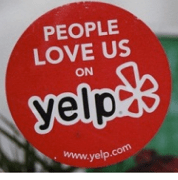Last year, several lawsuits emerged that accused Yelp of extorting businesses to advertise in exchange for positive reviews. Yelp has just announced that a judge granted Yelp’s request to dismiss these suits.
For background, the lawsuits claimed that after declining a request to purchase advertising on Yelp, a number of positive reviews from businesses’ listings on the reviews site mysteriously disappeared, downgrading the company’s rating on the site.
In February of 2010, two law firms, Beck & Lee from Miami and The Weston Firm in San Diego, filed a class action lawsuit in Los Angeles federal court alleging unfair business practices by Yelp. And in 2009, the East Bay Express ran a story basically accusing Yelp of being in the ‘Business of Extortion 2.0’, which covered similar ground. Shortly after reporter Kathleen Richards published the article, Yelp vehemently denied everything and called her piece inaccurate. A number of similar copy cat suits also emerged.
As CEO and founder Jeremy Stoppelman writes “our automated system applies the same objective criteria to all reviews regardless of a business’s advertiser status. (Just check a Yelp advertiser’s business page — I bet they have a negative review or two; after all, you just can’t please everyone all the time.)
Last year, Yelp made some adjustments to its review process. For example, Yelp removed a feature that allowed businesses that advertised with Yelp to place their favorite review above others. It also let users see reviews that have been removed by its (automated) “review filter,” which is designed to help prevent business owners from posting all too positive reviews of their own company or malicious reviews of competitors.
Yelp also established a Small Business Advisory Council’ whose members have provided the company’s management with “guidance and perspective regarding the concerns of small business owners”.
Stoppelman admits that there are flaws to the system, writing, Additionally, since protecting content integrity is a difficult task, our automated algorithm isn’t perfect: sometimes legitimate content can get caught. This is an unfortunate reality in an environment where some folks are determined to try to game the system, but it is a price we are willing to pay to protect consumers and remain a useful resource.
The dismissal of the lawsuits means that the plaintiffs can’t sue Yelp again. It’s surely a relief to have these allegations dismissed. Now Yelp can go back to focusing on its potential IPO in 2012.
